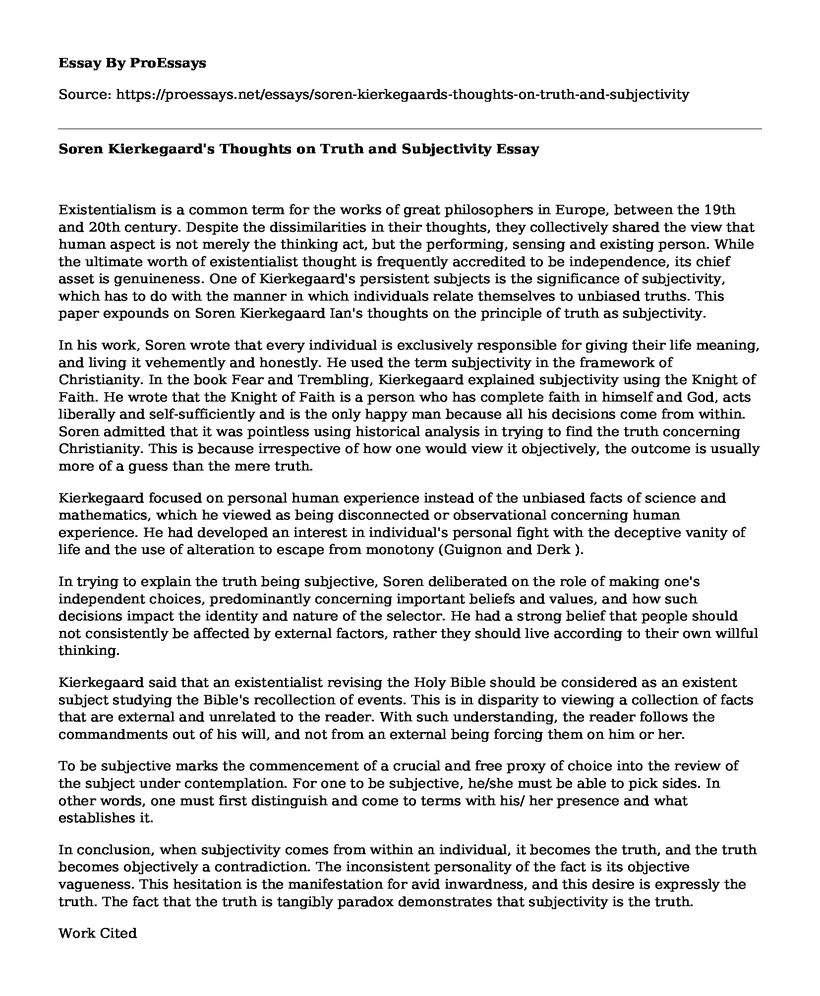Existentialism is a common term for the works of great philosophers in Europe, between the 19th and 20th century. Despite the dissimilarities in their thoughts, they collectively shared the view that human aspect is not merely the thinking act, but the performing, sensing and existing person. While the ultimate worth of existentialist thought is frequently accredited to be independence, its chief asset is genuineness. One of Kierkegaard's persistent subjects is the significance of subjectivity, which has to do with the manner in which individuals relate themselves to unbiased truths. This paper expounds on Soren Kierkegaard Ian's thoughts on the principle of truth as subjectivity.
In his work, Soren wrote that every individual is exclusively responsible for giving their life meaning, and living it vehemently and honestly. He used the term subjectivity in the framework of Christianity. In the book Fear and Trembling, Kierkegaard explained subjectivity using the Knight of Faith. He wrote that the Knight of Faith is a person who has complete faith in himself and God, acts liberally and self-sufficiently and is the only happy man because all his decisions come from within. Soren admitted that it was pointless using historical analysis in trying to find the truth concerning Christianity. This is because irrespective of how one would view it objectively, the outcome is usually more of a guess than the mere truth.
Kierkegaard focused on personal human experience instead of the unbiased facts of science and mathematics, which he viewed as being disconnected or observational concerning human experience. He had developed an interest in individual's personal fight with the deceptive vanity of life and the use of alteration to escape from monotony (Guignon and Derk ).
In trying to explain the truth being subjective, Soren deliberated on the role of making one's independent choices, predominantly concerning important beliefs and values, and how such decisions impact the identity and nature of the selector. He had a strong belief that people should not consistently be affected by external factors, rather they should live according to their own willful thinking.
Kierkegaard said that an existentialist revising the Holy Bible should be considered as an existent subject studying the Bible's recollection of events. This is in disparity to viewing a collection of facts that are external and unrelated to the reader. With such understanding, the reader follows the commandments out of his will, and not from an external being forcing them on him or her.
To be subjective marks the commencement of a crucial and free proxy of choice into the review of the subject under contemplation. For one to be subjective, he/she must be able to pick sides. In other words, one must first distinguish and come to terms with his/ her presence and what establishes it.
In conclusion, when subjectivity comes from within an individual, it becomes the truth, and the truth becomes objectively a contradiction. The inconsistent personality of the fact is its objective vagueness. This hesitation is the manifestation for avid inwardness, and this desire is expressly the truth. The fact that the truth is tangibly paradox demonstrates that subjectivity is the truth.
Work Cited
Guignon, Charles B and Pereboom Derk . Existentialism: basic writings. Hackett: Indianapolis, 2001. Print.
Cite this page
Soren Kierkegaard's Thoughts on Truth and Subjectivity. (2021, May 14). Retrieved from https://proessays.net/essays/soren-kierkegaards-thoughts-on-truth-and-subjectivity
If you are the original author of this essay and no longer wish to have it published on the ProEssays website, please click below to request its removal:
- Effect of Music Therapy on the Cognitive Functions, Anxiety, and Depressive Symptoms
- Australian Perception, Media Law and Ethics Paper Example
- Essay Sample on Mental Health and Depression
- The Connection of Health Promotion Principles to Mental Health Policies Essay Example
- Paper Example on CBT: Correcting False Self-Beliefs to Improve Mood, Self-Concept, & Behaviour
- Every Individual Unique: Traits, Culture & Personality - Essay Sample
- Morality & Abortion: An Ethical Dilemma - Essay Sample







